Im Monitor werden in unregelmäßigen Abständen aktuelle Publikationen aus den letzten 6 Monaten vorgestellt, die für die Comicforschung relevant sein könnten. Die kurzen Ankündigungstexte dazu stammen von den jeweiligen Verlagsseiten. Haben Sie Anregungen oder Hinweise auf Neuerscheinungen, die übersehen worden sind und hier erwähnt werden sollten? Das Team freut sich über eine Mail an redaktion@comicgesellschaft.de. -> Zu früheren Monitoren.
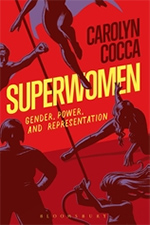
Superwomen:
Gender, Power, and Representation
Carolyn Cocca
Bloomsbury Academic
288 Seiten
ISBN 978-1-5013-1657-9 (Paperback)
~$ 29,95
September 2016
Verlagsseite
Over the last 75 years, superheroes have been portrayed most often as male, heterosexual, white, and able-bodied. Today, a time when many of these characters are billion-dollar global commodities, there are more female superheroes, more queer superheroes, more superheroes of color, and more disabled superheroes–but not many more. Superwomen investigates how and why female superhero characters have become more numerous but are still not-at-all close to parity with their male counterparts; how and why they have become a flashpoint for struggles over gender, sexuality, race, and disability; what has changed over time and why in terms of how these characters have been written, drawn, marketed, purchased, read, and reacted to; and how and why representations of superheroes matter, particularly to historically underrepresented and stereotyped groups.
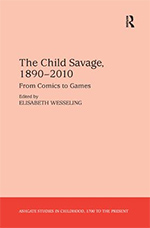
The Child Savage, 1890–2010:
From Comics to Games
Elisabeth Wesseling (Hrsg.)
Routledge
258 Seiten
ISBN 978-1-1382-4728-4 (Paperback)
~£ 34,99
September 2016
Verlagsseite
Taking up the understudied relationship between the cultural history of childhood and media studies, this volume traces twentieth-century migrations of the child-savage analogy from colonial into postcolonial discourse across a wide range of old and new media. Older and newer media such as films, textbooks, children’s literature, periodicals, comic strips, children’s radio, and toys are deeply implicated in each other through ongoing ‚remediation‘, meaning that they continually mimic, absorb and transform each other’s representational formats, stylistic features, and content. Media theory thus confronts the cultural history of childhood with the challenge of re-thinking change in childhood imaginaries as transformation-through-repetition patterns, rather than as rise-shine-decline sequences. This volume takes up this challenge, demonstrating that one historical epoch may well accommodate diverging childhood repertoires, which are recycled again and again as they are played out across a whole gamut of different media formats in the course of time.
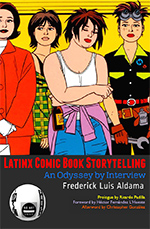
Latinx Comic Book Storytelling:
An Odyssey by Interview
Frederick Luis Aldama (Hrsg.)
San Diego State University Press
270 Seiten
ISBN 978-1-9385-3792-9 (Paperback)
~$ 24,95
Oktober 2016
Verlagsseite
The US comic’s scene is evolving-along with the rest of the culture-slowly, sometimes painfully, but inexorably towards a greater diversity of readers & creators, of new styles & stories. This book gives us a series of intimate conversations with several generations of Latin@ cartoonists (diverse themselves in their backgrounds and interests) juggling craft and art with heritage and language. These pioneers have their noses to their drawing boards and tablets but they keep their eyes on the larger significance of their work. In this timely and transformative collection of interviews, Aldama brings to life the stories, achievements, and creative process of 29 Latino-and Latina!-comic book artists. Jettisoned to new heights of exploration, this vertiginous journey opens us to a world of breathtaking visual-verbal creativity and the embrace of a resplendently diverse and eager community of readers. Latino comic book storytelling, its characters, and wondrous world-makings vitally transform, renew, and replenish the comic’s field. They are the revolution-and Aldama’s at the frontlines to capture it all.
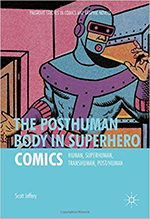
The Posthuman Body in Superhero Comics:
Human, Superhuman, Transhuman, Post/Human
Scott Jeffery
Palgrave MacMillan
264 Seiten
ISBN 978-1-137-57822-8 (Hardcover)
~€ 85,59
Oktober 2016
Verlagsseite
This book examines the concepts of Post/Humanism and Transhumanism as depicted in superhero comics. Recent decades have seen mainstream audiences embrace the comic book Superhuman. Meanwhile there has been increasing concern surrounding human enhancement technologies, with the techno-scientific movement of Transhumanism arguing that it is time humans took active control of their evolution. Utilising Deleuze and Guattari’s notion of the rhizome as a non-hierarchical system of knowledge to conceptualize the superhero narrative in terms of its political, social and aesthetic relations to the history of human technological enhancement, this book draws upon a diverse range of texts to explore the way in which the posthuman has been represented in superhero comics, while simultaneously highlighting its shared historical development with Post/Humanist critical theory and the material techno-scientific practices of Transhumanism.
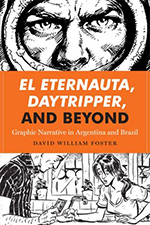
El Eternauta, Daytripper, and Beyond:
Graphic Narrative in Argentina and Brazil
David William Foster
University of Texas Press
174 Seiten
ISBN 978-1-4773-1085-4 (Hardcover)
~$ 16,72
Oktober 2016
Verlagsseite
El Eternauta, Daytripper, and Beyond examines the graphic narrative tradition in the two South American countries that have produced the medium’s most significant and copious output. Argentine graphic narrative emerged in the 1980s, awakened by Héctor Oesterheld’s groundbreaking 1950s serial El Eternauta. After Oesterheld was “disappeared” under the military dictatorship, El Eternauta became one of the most important cultural texts of turbulent mid-twentieth-century Argentina. Today its story, set in motion by an extraterrestrial invasion of Buenos Aires, is read as a parable foretelling the “invasion” of Argentine society by a murderous tyranny. Because of El Eternauta, graphic narrative became a major platform for the country’s cultural redemocratization. In contrast, Brazil, which returned to democracy in 1985 after decades of dictatorship, produced considerably less analysis of the period of repression in its graphic narratives. In Brazil, serious graphic narratives such as Fábio Moon and Gabriel Bá’s Daytripper, which explores issues of modernity, globalization, and cross-cultural identity, developed only in recent decades, reflecting Brazilian society’s current and ongoing challenges. Besides discussing El Eternauta and Daytripper, David William Foster utilizes case studies of influential works—such as Alberto Breccia and Juan Sasturain’s Perramus series, Angélica Freitas and Odyr Bernardi’s Guadalupe, and others—to compare the role of graphic narratives in the cultures of both countries, highlighting the importance of Argentina and Brazil as anchors of the production of world-class graphic narrative.

Re-Constructing the Man of Steel:
Superman 1938–1941, Jewish American History, and the Invention of the Jewish–Comics Connection
Martin Lund
Palgrave MacMillan
215 Seiten
ISBN 978-3-319-42959-5 (Hardcover)
~€ 94,94
November 2016
Verlagsseite
In this book, Martin Lund challenges contemporary claims about the original Superman’s supposed Jewishness and offers a critical re-reading of the earliest Superman comics. Engaging in critical dialogue with extant writing on the subject, Lund argues that much of recent popular and scholarly writing on Superman as a Jewish character is a product of the ethnic revival, rather than critical investigations of the past, and as such does not stand up to historical scrutiny. In place of these readings, this book offers a new understanding of the Superman created by Jerry Siegel and Joe Shuster in the mid-1930s, presenting him as an authentically Jewish American character in his own time, for good and ill.